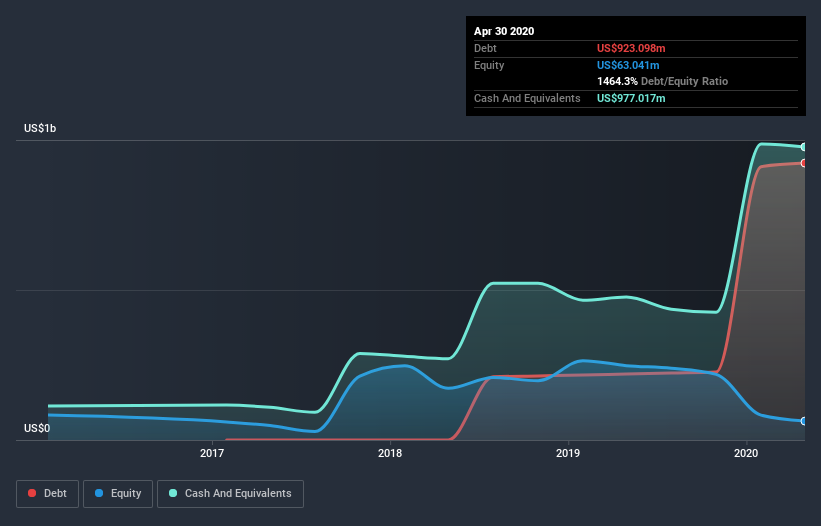Is MongoDB (NASDAQ:MDB) Using Debt Sensibly?

Warren Buffett famously said, 'Volatility is far from synonymous with risk.' So it seems the smart money knows that debt - which is usually involved in bankruptcies - is a very important factor, when you assess how risky a company is. We can see that MongoDB, Inc. (NASDAQ:MDB) does use debt in its business. But the real question is whether this debt is making the company risky.
What Risk Does Debt Bring?
Debt and other liabilities become risky for a business when it cannot easily fulfill those obligations, either with free cash flow or by raising capital at an attractive price. In the worst case scenario, a company can go bankrupt if it cannot pay its creditors. While that is not too common, we often do see indebted companies permanently diluting shareholders because lenders force them to raise capital at a distressed price. Of course, the upside of debt is that it often represents cheap capital, especially when it replaces dilution in a company with the ability to reinvest at high rates of return. When we think about a company's use of debt, we first look at cash and debt together.
Check out our latest analysis for MongoDB
What Is MongoDB's Net Debt?
The image below, which you can click on for greater detail, shows that at April 2020 MongoDB had debt of US$923.1m, up from US$220.1m in one year. But it also has US$977.0m in cash to offset that, meaning it has US$53.9m net cash.
How Healthy Is MongoDB's Balance Sheet?
We can see from the most recent balance sheet that MongoDB had liabilities of US$241.0m falling due within a year, and liabilities of US$1.03b due beyond that. On the other hand, it had cash of US$977.0m and US$80.8m worth of receivables due within a year. So its liabilities outweigh the sum of its cash and (near-term) receivables by US$216.0m.
This state of affairs indicates that MongoDB's balance sheet looks quite solid, as its total liabilities are just about equal to its liquid assets. So while it's hard to imagine that the US$11.7b company is struggling for cash, we still think it's worth monitoring its balance sheet. Despite its noteworthy liabilities, MongoDB boasts net cash, so it's fair to say it does not have a heavy debt load! When analysing debt levels, the balance sheet is the obvious place to start. But ultimately the future profitability of the business will decide if MongoDB can strengthen its balance sheet over time. So if you're focused on the future you can check out this free report showing analyst profit forecasts.
In the last year MongoDB wasn't profitable at an EBIT level, but managed to grow its revenue by 51%, to US$463m. Shareholders probably have their fingers crossed that it can grow its way to profits.
So How Risky Is MongoDB?
We have no doubt that loss making companies are, in general, riskier than profitable ones. And the fact is that over the last twelve months MongoDB lost money at the earnings before interest and tax (EBIT) line. Indeed, in that time it burnt through US$43.3m of cash and made a loss of US$196.2m. While this does make the company a bit risky, it's important to remember it has net cash of US$53.9m. That kitty means the company can keep spending for growth for at least two years, at current rates. With very solid revenue growth in the last year, MongoDB may be on a path to profitability. Pre-profit companies are often risky, but they can also offer great rewards. There's no doubt that we learn most about debt from the balance sheet. However, not all investment risk resides within the balance sheet - far from it. To that end, you should learn about the 4 warning signs we've spotted with MongoDB (including 1 which is is potentially serious) .
If, after all that, you're more interested in a fast growing company with a rock-solid balance sheet, then check out our list of net cash growth stocks without delay.
This article by Simply Wall St is general in nature. It does not constitute a recommendation to buy or sell any stock, and does not take account of your objectives, or your financial situation. We aim to bring you long-term focused analysis driven by fundamental data. Note that our analysis may not factor in the latest price-sensitive company announcements or qualitative material. Simply Wall St has no position in any stocks mentioned.
Have feedback on this article? Concerned about the content? Get in touch with us directly. Alternatively, email editorial-team@simplywallst.com.

 Yahoo Finance
Yahoo Finance 
